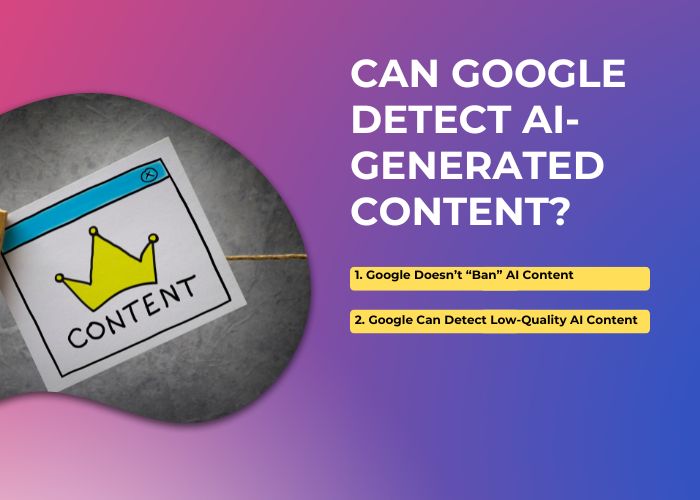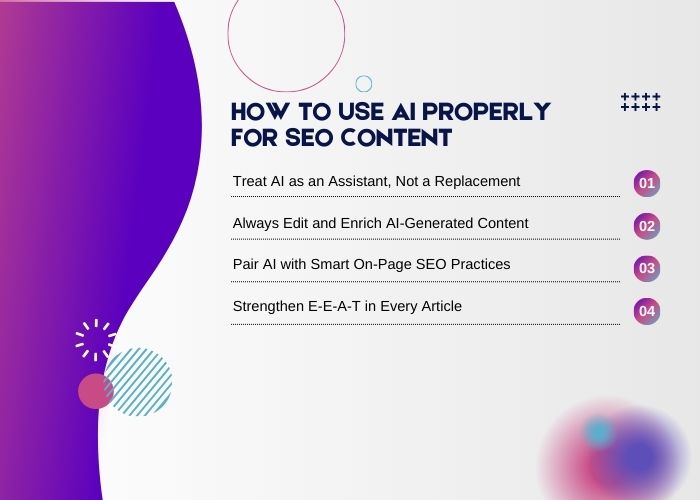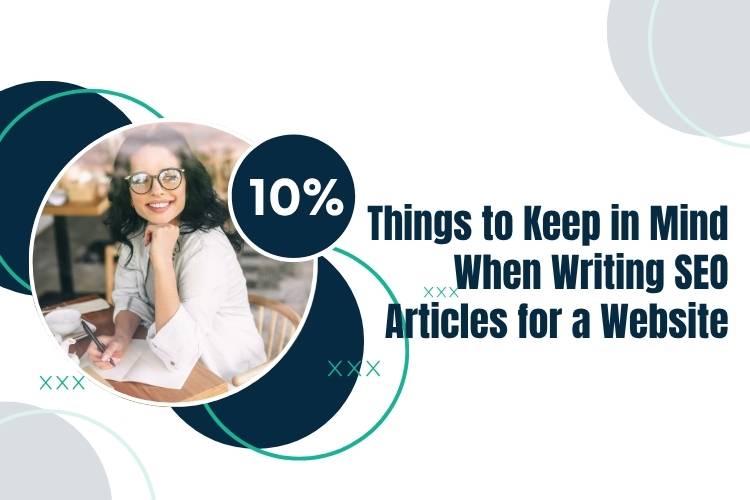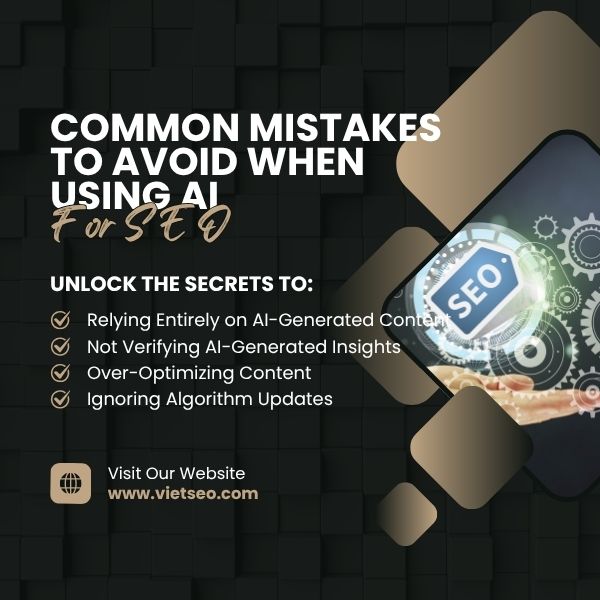Can Google Detect AI-Generated Content? Insights & Best Practices
Can Google Detect AI-Generated Content?
As AI-powered writing tools grow more sophisticated and widely adopted, the big question remains: can search engines tell the difference between human-written and AI-generated articles? At VietSEO, we’ve analyzed Google’s official guidelines and real-world practices to better understand how AI content is handled, what pitfalls to avoid, and how businesses can make AI-assisted writing work for them without harming SEO performance.
1. Google Doesn’t “Ban” AI Content
In 2023, Google clarified its stance: it does not outright ban AI-generated content. Instead, its algorithms focus on the quality and helpfulness of the material, regardless of whether it was created by a human or assisted by a machine.
“Using automation—including AI—to generate content with the primary purpose of manipulating ranking in search results is a violation. However, using AI to generate helpful, original content is not against our guidelines.”
— Google Search Central
In other words, if you use AI as a tool to support your writing process—while ensuring the final article is accurate, useful, and original—your content can still perform well in Google search results.
2. Google Can Detect Low-Quality AI Content
While AI content isn’t banned, Google’s systems are very good at spotting writing that looks automatically generated and unrefined. Common warning signs include:
- Stiff, robotic sentence structures
- Overly repetitive ideas that don’t add value
- Keyword stuffing or awkward phrasing
- Missing citations or lack of authoritative sources
- Zero personal experience, insights, or original viewpoints
Content with these flaws is often labeled as “thin content”, which can hurt your rankings—or, in some cases, prevent the page from being indexed at all.
The Risks of Overusing AI Content
AI tools are incredibly helpful for speeding up the writing process, but relying on them too much can backfire. If not managed carefully, AI-generated text often turns out generic, shallow, or repetitive—content that fails to provide real value to readers. At Viet SEO, we caution businesses against publishing unedited AI text in bulk, as it can not only hurt your search rankings but also harm your brand’s reputation and user trust. Striking the right balance between automation and human creativity is essential for sustainable SEO growth.
1. Damage to Brand Reputation
When businesses depend entirely on AI, the output can be inaccurate, surface-level, or even misleading. Over time, this erodes your brand’s credibility and makes it harder to build trust with your audience.
2. Duplication and Plagiarism Risks
AI systems are trained on massive datasets, which means they sometimes generate very similar content for different users. If you publish these outputs without editing, you risk duplication issues—or worse, accidental plagiarism. Search engines like Google may penalize your site, costing you hard-earned visibility.
3. Weak E-E-A-T Signals
Google’s ranking systems now place strong emphasis on E-E-A-T: Experience, Expertise, Authoritativeness, and Trustworthiness. Fully AI-written articles often miss these human qualities. Without personal insights, professional knowledge, or credible sources, such content struggles to compete with authentic, expert-driven pages.
How to Use AI Properly for SEO Content
When applied strategically, AI can be a powerful partner in content creation. The key is not to let automation take over completely, but to combine AI-generated drafts with human creativity, expertise, and oversight. At VietSEO, we recommend treating AI as a supportive tool that helps with efficiency—while still ensuring your content remains authentic, valuable, and fully aligned with Google’s quality standards.
1. Treat AI as an Assistant, Not a Replacement
Think of AI as your brainstorming partner. It can quickly generate outlines, title variations, or draft sections to save you time. But the final piece should always carry your unique voice, accurate information, and insights that AI cannot replicate.
Examples:
- Ask AI to suggest 10 headline ideas → You select and refine the one that best fits your audience.
- Use AI to draft basic product descriptions → You then add real specifications, customer feedback, and your brand’s tone of voice.
2. Always Edit and Enrich AI-Generated Content
Raw AI text should never be published as-is. Human editing is crucial for turning a generic draft into high-quality content. This means:
- Rewriting sentences to sound natural, clear, and engaging
- Adding reliable data, statistics, or citations
- Weaving in personal experiences or expert commentary
- Polishing meta titles, descriptions, and headings with relevant keywords
3. Pair AI with Smart On-Page SEO Practices
Whether the content is human-written or AI-assisted, following SEO best practices is non-negotiable. Make sure your articles include:
- Natural use of primary and secondary keywords
- A clear structure with H2 and H3 subheadings
- Visual aids like images, infographics, or comparison tables
- Comprehensive coverage (1,500–3,000+ words for in-depth topics)
- Internal links to relevant pages and external links to trusted sources
- Optimized meta title and description that meet Google’s length guidelines
4. Strengthen E-E-A-T in Every Article
To improve both rankings and credibility, build Experience, Expertise, Authoritativeness, and Trustworthiness into your content. You can do this by:
- Displaying real author bios with credentials and expertise
- Citing authoritative sources such as academic research or reputable publications
- Sharing practical experience and updated insights specific to your industry
- Adding validation or commentary from recognized experts whenever possible
Top AI Tools for SEO Writing
As businesses aim to publish more content in less time, AI-powered writing tools have become valuable allies in modern SEO strategies. Used correctly, they can speed up the writing process, help with keyword optimization, and improve overall content structure. At Viet SEO, we recommend a few standout AI tools that balance efficiency with creativity—while still requiring human oversight to maintain originality and user trust.
1. ChatGPT (OpenAI)
Pros:
- Generates content quickly across many tones and languages
- Excellent for brainstorming ideas, creating outlines, and drafting initial versions
Cons:
- Responses must be fact-checked for accuracy
- The free version may lack access to the most current information
2. Jasper AI
Pros:
- Tailored for marketing content such as blogs, ads, and email copy
- Can adapt to your brand’s unique “voice” for more consistent messaging
Cons:
- Paid plans can be costly for small businesses
- Works best when combined with human editing for depth and originality
3. Writesonic
Pros:
- Offers a wide range of ready-made templates for different content types
- Particularly useful for product descriptions, landing pages, and blog posts
Cons:
- Content can feel formulaic without customization
- Limited depth for complex or highly technical topics
Combining AI + Human: The Recipe for Exceptional Content
The strongest content today doesn’t come from AI alone—or from humans alone. Instead, it’s born from a thoughtful partnership between the two. At VietSEO, we’ve found that blending AI’s speed and efficiency with human creativity and judgment leads to content that not only ranks well on search engines but also resonates deeply with readers.
AI excels at handling repetitive tasks, generating drafts quickly, and scaling content production. Humans, on the other hand, bring nuance, storytelling ability, and real-world expertise that AI simply cannot replicate. Together, they create a winning formula.
With the right balance, you can:
- Produce content up to 2–3 times faster
- Maintain high levels of quality, accuracy, and originality
- Boost SEO performance while keeping a strong human touch
Suggested Workflow:
- Start by letting AI create an SEO-focused outline.
- Use AI to draft rough sections or supporting text.
- Edit thoroughly—refine language, add unique insights, and ensure accuracy.
- Enrich the content with data, credible citations, and personal expertise.
- Optimize on-page elements: keywords, headings, visuals, tables, and metadata.
- Run plagiarism and grammar checks (e.g., with Copyscape, Grammarly).
- Publish the content and track results in Google Search Console to keep improving.
Conclusion
Google does not punish AI-generated content simply for being written by a machine. What truly matters is whether the content is helpful, original, and high quality. AI can be a powerful ally in your SEO strategy, but the best results come when it’s combined with human creativity, insight, and expertise.
At VietSEO, we encourage businesses to treat AI as a tool, not a replacement. Use it to speed up production, generate ideas, and optimize for SEO—but always refine the output with real knowledge, data, and personal experience. That’s how you create content that performs well on Google and genuinely connects with readers.
Whether you’re building a blog, growing your website, or shaping a full SEO campaign, don’t hesitate to integrate AI into your workflow. Just remember: both search engines and your audience will always reward content that is authentic, trustworthy, and insightful.
If this guide gave you clarity, we’d love for you to share it or bookmark it as a reference when shaping your own AI + SEO content strategy.




